Medications You Should Never Use After the Expiration Date
Most people know not to eat spoiled food, but many still take expired pills without a second thought. It’s easy to assume that if a medicine looks fine, it’s still safe. But when it comes to certain drugs, expiration dates aren’t just suggestions-they’re lifelines. The expiration date on your medication isn’t when it turns toxic; it’s the last day the manufacturer guarantees it will work as intended. And for some drugs, using them after that date isn’t just ineffective-it’s dangerous.
Why Expiration Dates Matter
The U.S. Food and Drug Administration (FDA) has required expiration dates on all prescription and over-the-counter medications since 1979. These dates aren’t pulled out of thin air. They’re based on strict stability testing under controlled conditions: temperature, humidity, and light exposure. Once a drug passes its expiration date, its chemical structure begins to change. Some lose strength. Others break down into compounds that can harm your body. A 2020 FDA study found that 90% of tested medications were still safe and effective up to 15 years past their expiration date-if stored perfectly. But here’s the catch: most of us don’t store medicine like a pharmaceutical lab. We keep it in the bathroom, near the sink, or in a hot car. Humidity and heat speed up degradation. And for certain critical drugs, even a small drop in potency can have serious consequences.Insulin: A Silent Killer When Expired
If you or someone you care for uses insulin, this is non-negotiable: never use expired insulin. Insulin is a protein-based hormone. Once it passes its expiration date, it starts to clump together. These protein aggregates reduce how well your body can absorb it. Research from the Journal of Diabetes Science and Technology shows expired insulin can lose up to 35% of its effectiveness. That means your blood sugar won’t drop like it should. You might feel fine-until your levels spike dangerously high. Cleveland Clinic’s 2023 review found that insulin stored in warm conditions (like a bathroom cabinet) degrades even faster. Even if the vial looks clear and the liquid hasn’t changed color, it may still be compromised. The rule? Replace insulin 28 days after opening-even if the expiration date is months away.Nitroglycerin: When Every Second Counts
Nitroglycerin tablets are used to relieve chest pain from angina. These pills are incredibly sensitive. They break down quickly when exposed to air, heat, or moisture. A study from University Hospitals Cleveland Medical Center found that within six months of expiration, nitroglycerin loses 40-60% of its potency. In an emergency, that’s the difference between relief and a heart attack. If your nitroglycerin bottle is more than three to six months old after opening, replace it. Don’t wait for it to look “off.” There’s no visual sign it’s gone bad. If you’ve had chest pain and your nitroglycerin is expired, call 911. Don’t rely on it.Liquid Antibiotics: More Than Just Weak
Liquid antibiotics like amoxicillin suspension are common for kids and adults with infections. But unlike pills, liquids don’t just lose strength-they can grow bacteria. Once opened, the preservatives that keep the solution sterile begin to weaken. After expiration, harmful microbes like Pseudomonas or Staphylococcus can multiply. The FDA’s 2019 antimicrobial resistance study linked expired liquid antibiotics to 12% of cases where infections didn’t fully clear. That’s not just a failed treatment-it’s a breeding ground for drug-resistant bacteria. If you’ve got a child with an ear infection and the antibiotic is past its date, get a new prescription. Don’t risk spreading resistant strains.Tetracycline: The Only Antibiotic That Turns Toxic
Tetracycline and its derivatives (like doxycycline) are an exception to the rule that expired drugs just lose potency. When these drugs break down, they form compounds that damage your kidneys. The FDA first warned about this in 1963-and it’s still true today. Even if the pills look fine, degraded tetracycline can cause renal tubular damage, leading to acute kidney injury. There’s no safe window for using expired tetracycline. If you find an old bottle, throw it out. Don’t take it “just in case.” The risk isn’t theoretical-it’s documented in multiple medical case reports.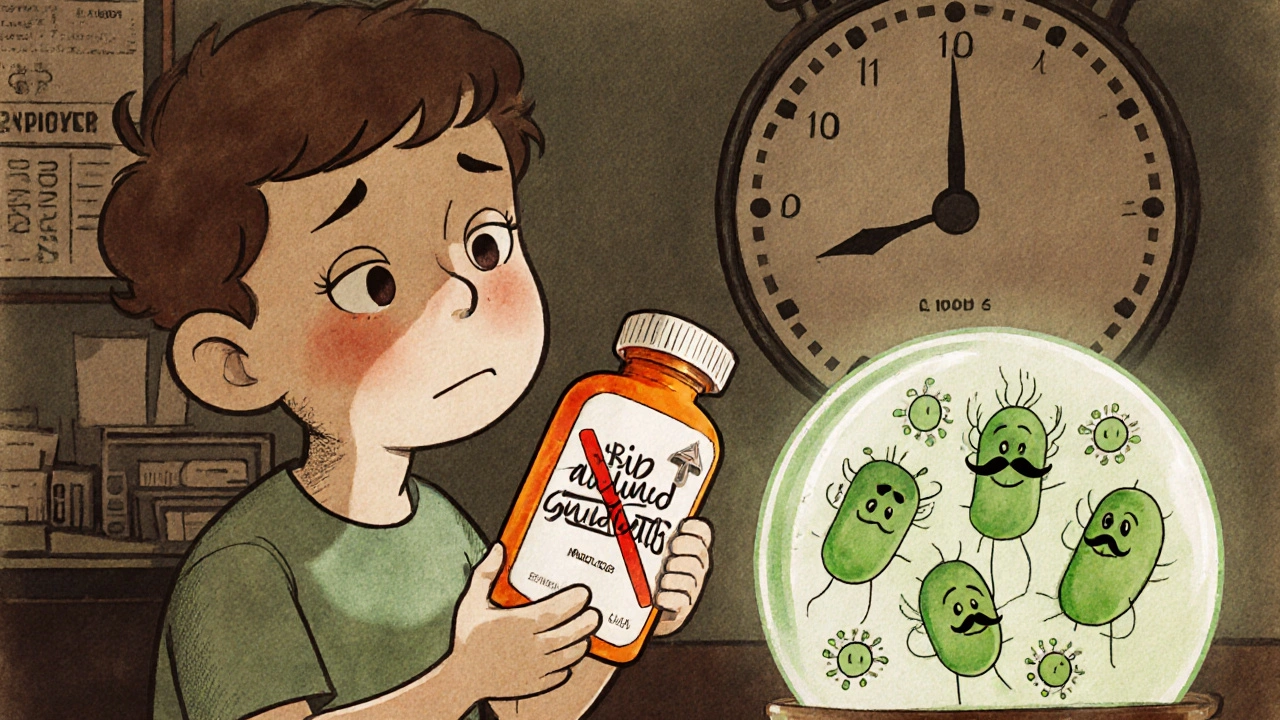
Epinephrine Auto-Injectors: Life or Death
EpiPens save lives during severe allergic reactions. But they’re also one of the most unreliable medications past expiration. Mylan Pharmaceuticals’ stability data shows epinephrine loses about 15% of its potency each year after the expiration date. After two years? You might only have half the dose you need. Swedish Health Services’ 2023 emergency guidelines state clearly: never use an expired EpiPen. In their records, 14 patients delayed calling 911 because they tried to use an expired pen. Three ended up hospitalized because the dose didn’t work. If your EpiPen is expired, replace it. Keep a spare. Don’t gamble with anaphylaxis.Rescue Inhalers: Breathing on Borrowed Time
Albuterol inhalers are critical for asthma attacks. But the propellant and active ingredient degrade over time. University Hospitals’ 2023 research found that six months after expiration, these inhalers lose 25-30% of their bronchodilator effect. That means during a flare-up, you might not get enough air. You might think, “I’ll just spray more.” But that won’t help. The metered dose system isn’t designed for extra puffs. You could overdose on the propellant or damage the valve. If your inhaler is expired, get a new one. Your lungs can’t afford to wait.Eye and Ear Drops: A Gateway to Infection
Eye and ear drops are sterile when sealed. Once opened, they’re vulnerable. The preservatives inside keep bacteria out-but they fade after expiration. Using expired drops can introduce Pseudomonas aeruginosa into your eye or ear canal. Cleveland Clinic’s ophthalmology team documented 17 cases of bacterial keratitis (corneal ulcers) between 2020 and 2022-all from patients using expired eye drops. One woman lost vision in one eye. Ear drops can cause otitis externa, a painful infection that’s hard to treat. If your drops are past their date, toss them. Don’t risk blindness or chronic ear pain.Thyroid Medication: Tiny Doses, Big Consequences
Levothyroxine, used for hypothyroidism, requires precise dosing. Even a 10% drop in potency can throw your metabolism off. The American Thyroid Association’s 2022 report found that 68% of patients with existing thyroid conditions developed new symptoms-fatigue, weight gain, depression-after using expired levothyroxine. Unlike insulin or epinephrine, you won’t feel an immediate crisis. But over weeks or months, your body slowly falls out of balance. Your doctor won’t know why your TSH levels are creeping up. It could be your expired pill. Replace thyroid meds on time.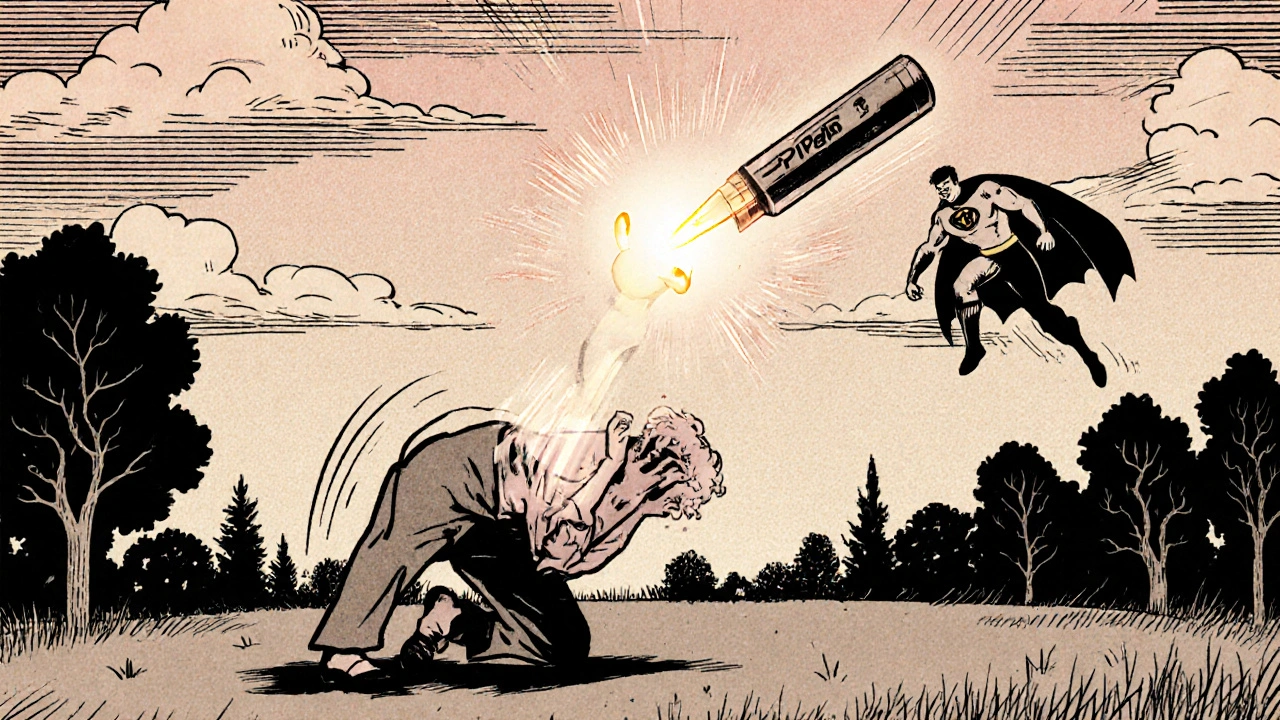
What About Other Pills?
For most solid medications-like painkillers, blood pressure pills, or antidepressants-the risk is lower. They may lose some strength, but they’re unlikely to turn harmful. Still, don’t count on them. If you’re treating a chronic condition, you need full potency. If you’re using an old pill for a headache, you might not get relief. The FDA doesn’t recommend using any expired medication. But the real danger lies in the ones listed above. If you’re unsure, ask your pharmacist. They’ll tell you which ones to throw out immediately.How to Store Medications Right
You can extend a drug’s life with proper storage. Keep pills in a cool, dry place-like a bedroom dresser, not a bathroom cabinet. Humidity is the enemy. A 2023 Cleveland Clinic study found medications stored in bathrooms degrade 2.3 times faster. Avoid direct sunlight. Don’t leave pills in your car. Don’t store them in the fridge unless the label says to. And never transfer pills to a different container. The original packaging has moisture barriers and child-resistant features.How to Dispose of Expired Medications
Don’t flush pills down the toilet unless the label says to. Most drugs should go to a drug take-back program. The DEA’s National Prescription Drug Take Back Day collected over 900,000 pounds of unused meds in 2022. Pharmacies, hospitals, and police stations often have drop boxes. If there’s no take-back option nearby, mix pills with coffee grounds or cat litter in a sealed bag before tossing them in the trash. This keeps kids and pets from finding them.When in Doubt, Toss It
You might think you’re saving money by using old pills. But the cost of a missed dose, a bad reaction, or an emergency room visit is far higher. For insulin, nitroglycerin, epinephrine, liquid antibiotics, tetracycline, eye drops, ear drops, and thyroid meds-expiration means stop. Keep a medicine cabinet checklist. Every six months, go through your pills. Write down expiration dates on a sticky note. If it’s expired and it’s on this list, throw it out. No exceptions. Your health isn’t worth the risk. When it comes to these medications, expiration isn’t a suggestion-it’s a safety line you don’t cross.Can I still use expired painkillers like ibuprofen or acetaminophen?
For most solid pain relievers like ibuprofen or acetaminophen, using them a year or two past expiration is usually safe-they just may not work as well. The FDA’s 2020 study found that 90% of solid medications retain potency for years after expiration if stored properly. But if the pills are cracked, discolored, or smell odd, throw them out. Don’t rely on them for serious pain.
Is it dangerous to take expired antibiotics that aren’t tetracycline?
It’s not usually toxic, but it’s risky. Expired antibiotics may not kill all the bacteria, leaving behind stronger strains. This contributes to antibiotic resistance, a major public health threat. The CDC reports that improper use of expired antibiotics is linked to harder-to-treat infections. Always get a new prescription if you’re still sick after your course ends.
Why do some medications expire so quickly after opening?
Once you open a bottle, you expose the medication to air, moisture, and bacteria. Liquid antibiotics, eye drops, and nitroglycerin are especially sensitive because they’re not sealed in airtight packaging. Even if the expiration date is months away, manufacturers set shorter “use by” dates after opening based on real-world degradation rates.
Can I tell if a medication has gone bad just by looking at it?
Sometimes-but not always. Cloudy insulin, discolored tablets, or a strange smell are red flags. But many degraded medications look perfectly normal. That’s why you can’t rely on appearance alone. If it’s expired and it’s on the high-risk list (insulin, epinephrine, etc.), throw it out even if it looks fine.
What should I do if I accidentally took an expired EpiPen?
Call 911 immediately. Even if you feel okay, an expired EpiPen might not have delivered enough epinephrine. Anaphylaxis can return hours later. Go to the ER anyway. They’ll monitor you and give you a full dose if needed. Never assume an expired auto-injector worked just because you felt better for a moment.

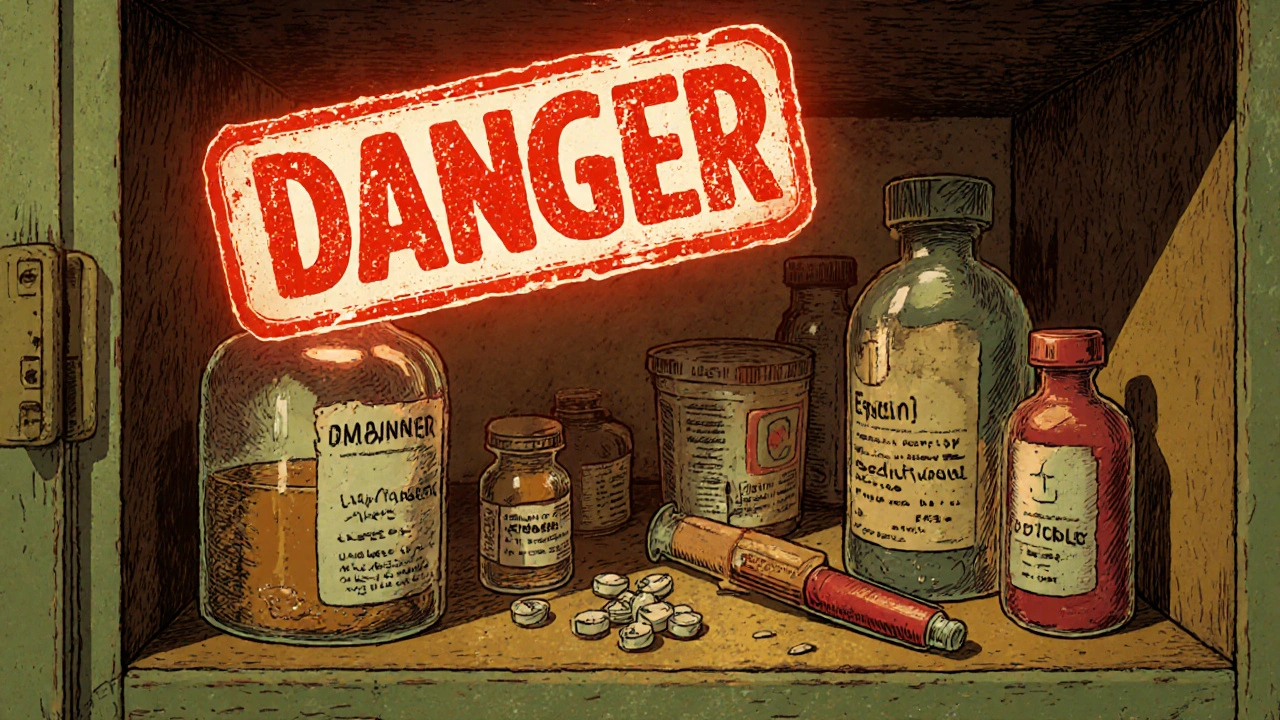


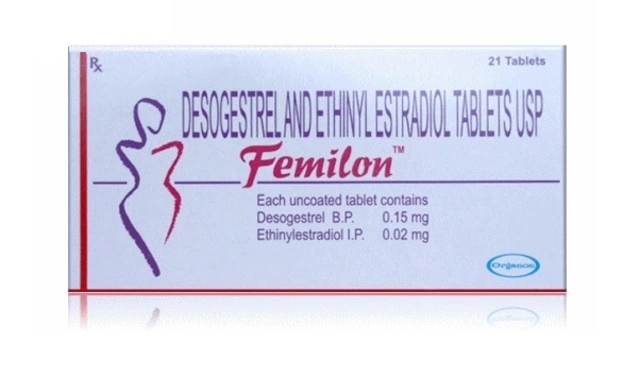
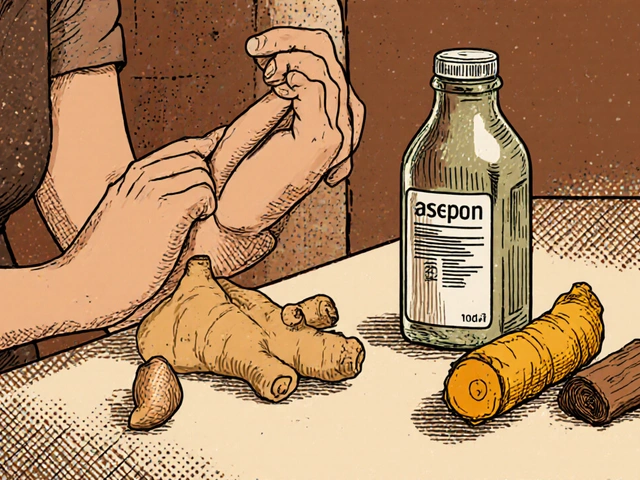
13 Comments
Ravinder Singh
November 19, 2025 at 03:28
Man, this post saved my life last year. I had an old insulin vial in the bathroom cabinet and almost used it after my cat knocked over my new one. 😅 Thanks for the wake-up call - now I label everything with a sharpie and check every 6 months. No more guessing games with my health.
Russ Bergeman
November 20, 2025 at 10:57
So… you’re telling me I shouldn’t take my 3-year-old ibuprofen? Lol. I’ve been taking expired pills since college. I’m 42. Still standing. 😎
Dana Oralkhan
November 21, 2025 at 02:12
This is such an important reminder - especially for elderly parents or folks on tight budgets who feel guilty throwing medicine away. I keep a little checklist taped to my medicine cabinet. If it’s expired and on the high-risk list? Straight in the trash. No guilt. Your health isn’t a sacrifice zone.
Jeremy Samuel
November 21, 2025 at 17:55
expiration dates are just corporate scam to sell more pills lmao. i took my grandpas tetracycline from 1998 and my acne got better. also my kidneys? fine. 🤷♂️
Destiny Annamaria
November 22, 2025 at 19:27
YAS. I’m a nurse and I’ve seen so many ER visits from people using expired epinephrine or antibiotics. One kid nearly died because Mom ‘thought the EpiPen still worked.’ Please, people - if it’s expired and it’s life-saving? Don’t be cheap. Your life is worth more than $50.
Ron and Gill Day
November 24, 2025 at 17:26
Who even reads expiration dates anymore? The FDA is just another bureaucratic monster pushing fear to sell more drugs. I’ve taken expired meds for 20 years. I’m healthier than most of you.
Kristi Bennardo
November 25, 2025 at 03:54
Let me be perfectly clear: If you are taking expired medication, you are not just being careless - you are endangering your life and potentially the lives of others through antibiotic resistance. This is not a suggestion. It is a medical emergency waiting to happen.
Shiv Karan Singh
November 26, 2025 at 05:32
Bro, you think this is bad? In India, we’ve been using expired meds since the 80s. My aunt took expired insulin for 5 years. Still walking. Still cooking. You Americans overthink everything. 😏
Ravi boy
November 27, 2025 at 07:07
yea i just throw all my pills in the drawer and forget about em. sometimes they work sometimes they dont. if i feel sick i just drink water and chill. no biggie. 🤙
Matthew Karrs
November 28, 2025 at 12:07
90% of meds still work after 15 years? That’s a lie. The FDA is in bed with Big Pharma. They want you to buy new bottles so they can profit. You think they’d let you know how long drugs REALLY last? Nope. This whole post is propaganda.
Matthew Peters
November 29, 2025 at 20:02
I had a friend who used expired nitroglycerin during a panic attack - thought it was heart pain. She didn’t get relief. Called 911. Turns out it was anxiety. But if it HAD been cardiac? She’d be dead. This isn’t hypothetical. It’s terrifying.
daniel lopez
December 1, 2025 at 17:05
Look - I know what you’re thinking: ‘But I’ve got a whole cabinet full of old pills!’ Here’s the truth: you’re not saving money. You’re risking your life, your family’s health, and the future of antibiotics. The government doesn’t care. But I do. Throw it out. Now. Don’t wait for a crisis to wake you up.
Nosipho Mbambo
December 1, 2025 at 20:33
I’m from South Africa - we don’t always have access to new meds. But I still throw out insulin and epinephrine. No exceptions. Some things aren’t worth the gamble. Even if you’re poor, your life is priceless.